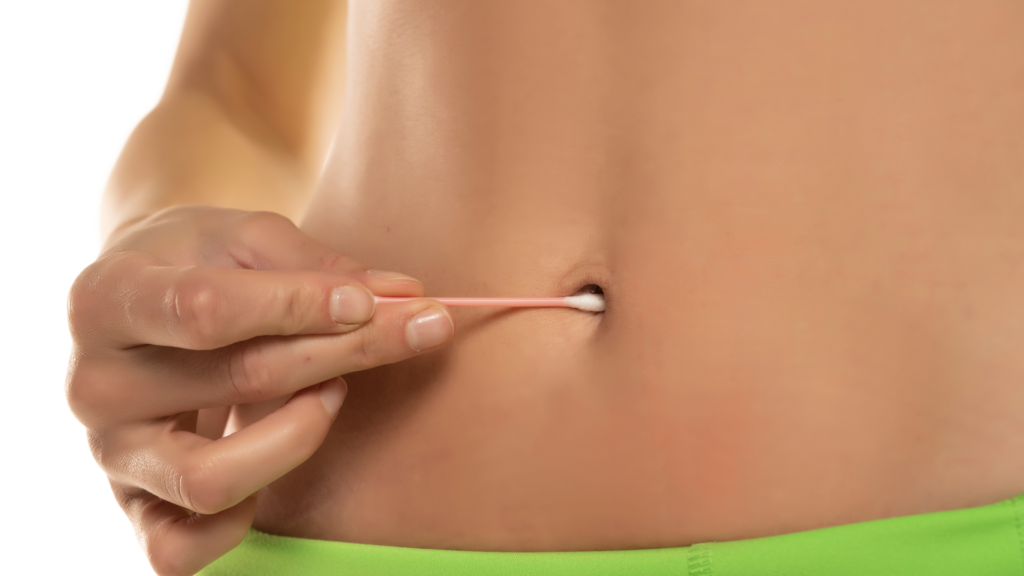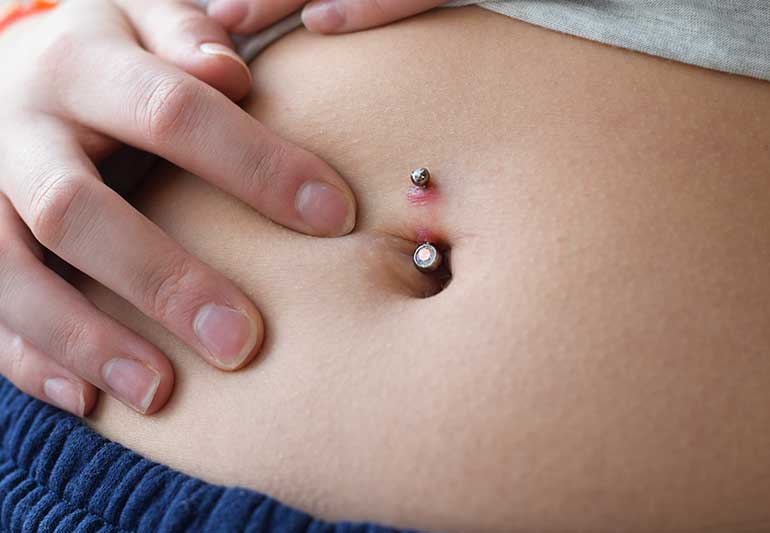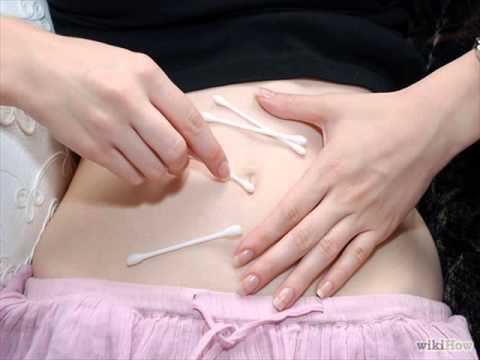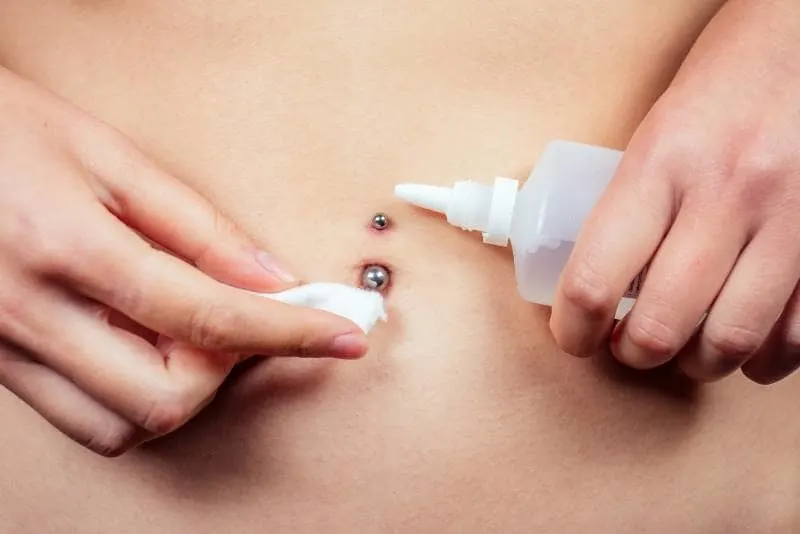Did you know that your belly button can be a hidden source of unpleasant odors, including the infamous “belly button smell”? While it might not be a commonly discussed topic, understanding the causes of belly button odor can help you maintain better hygiene and overall health. In this blog post, we’ll explore the factors contributing to belly button smell, discuss common causes, and provide tips for proper cleaning and prevention. So let’s dive right in and uncover the secrets behind this often-neglected body part!
Short Summary
- Understanding belly button odor involves recognizing the role of sweat, bacteria and dead skin cells.
- Poor hygiene, infections and cysts can cause a smelly belly button. Proper aftercare is important for piercings to reduce risks of infection.
- Maintaining good hygiene through regular cleaning with antibacterial soap and avoiding moisture traps are essential tips for preventing odors.
Understanding Belly Button Odor

Belly button odor, although not a widespread concern, is still a reality for many people. The main factors contributing to a smelly belly button are sweat, bacteria, and dead skin cells. The belly button provides an ideal environment for these elements to accumulate, creating a breeding ground for bacterial infection. With proper hygiene and regular washing, belly button odor can be managed effectively, ensuring that you feel fresh and comfortable throughout the day.
Let’s explore the role of sweat, bacteria, and dead skin cells, which the body produces naturally, in belly button odor, as well as the importance of proper belly button skin care, in more detail.
Sweat and Bacteria
Sweat and bacteria are natural components of the skin that can accumulate in belly buttons due to sweat and dirt buildup, as well as dead skin cells. When bacteria break down proteins in sweat, it can result in an unpleasant odor. A lack of regular cleaning, wearing sweaty tight clothing, and not showering after physical activity can lead to inadequate hygiene in the navel region, causing belly button smells.
To maintain a clean and odor-free belly button, it is recommended to shower daily and ensure that you thoroughly clean the navel area. Gently insert your index finger underneath the navel and gently massage it with soap and water to remove dirt, sweat, and dead skin cells.
Dead Skin Cells
Dead skin cells can accumulate in the belly button, potentially leading to unpleasant odors and even infections. This buildup can create an environment conducive to the growth of fungi and bacteria, such as Candida yeast. Candida thrives in moist, dark, and warm environments and can cause a pungent odor in the belly button due to inadequate hygiene or damage to the skin. It can also lead to skin irritation and infections, especially in individuals with diabetes who are more prone to Candida infection.
To prevent belly button odor caused by dead skin cells, it is essential to gently wash the area daily with antibacterial soap and water. Ensuring that your belly button is clean and free of moisture will help prevent the growth of bacteria and fungi, keeping unpleasant odors at bay.
Common Causes of a Smelly Belly Button

Now that we understand the factors contributing to belly button odor, let’s delve deeper into the common causes. These may include poor hygiene, infections, and cysts. Inadequate hygiene in the navel region can result from a lack of regular cleaning, wearing sweaty clothes, and not showering after physical activity.
Bacterial and fungal infections may also cause unpleasant odors emanating from the belly button. In some cases, cysts or pockets of fluid can form in the belly button; if they become infected, they may produce a foul smell. Let’s explore each of these causes in more detail.
Poor Hygiene
As we’ve mentioned earlier, poor hygiene can lead to a buildup of sweat, bacteria, and dead skin cells, causing an unpleasant belly button odor. By not maintaining proper cleanliness in the navel area, you create an environment where bacteria and fungi can thrive, potentially resulting in infections and foul smells.
To address the issue of poor hygiene, ensure that you clean your belly button regularly, removing dirt, sweat, and dead skin cells. Maintaining good hygiene practices will help prevent belly button odor and keep your navel area feeling fresh and comfortable.
Infections
Infections, such as Candida yeast or bacterial infections, can cause belly button odor and discharge. Signs of an infection or cyst resulting in belly button odor may include redness, discomfort, discharge, and swelling. Umbilical infection may occur post-surgery to treat umbilical hernia or due to piercing around the navel, resulting in a pus-filled belly button and discomfort, which could be a contributing factor to belly button odor.
If you suspect an infection is causing your belly button odor, it is important to seek medical help promptly. Treatment options may include antifungal or antibiotic creams or oral antibiotics, depending on the type and severity of the infection.
Cysts
Cysts are sac-like structures filled with fluid, pus, or other substances. Epidermoid, pilar, and sebaceous cysts can potentially cause belly button odor if they become infected or rupture. These cysts can form due to various reasons, including injury, infection, or other underlying issues.
If you suspect that a cyst is the cause of your belly button odor, it is important to consult a healthcare professional for a proper diagnosis and treatment plan. Depending on the type and severity of the cyst, treatment options may include surgical removal or drainage, as well as medication to treat any accompanying infection.
Belly Button Piercing and Odor

Belly button piercing has become a popular trend in recent years, but it’s not without risks. When considering a belly button piercing, it’s important to be aware of the potential risks of infection and odor. A piercing-related infection can occur if proper aftercare and hygiene are not maintained, resulting in smelly discharge, swelling, and redness around the piercing.
Let’s take a closer look at the risks of belly button infection and prevention tips for belly button piercings.
Risks of Infection

Infections from piercings can cause redness, pain, discharge, and bad smell. Signs of an infected belly button piercing may include redness, pain, and discharge. If you have a persistent odor from your piercing despite proper cleaning, or if symptoms such as pain, discharge, or inflammation are present, it is recommended to seek medical help.
Depending on the type and severity of the fungal infection, treatment options may include oral antibiotics, antifungal or antibiotic creams, or even surgical removal of the piercing. It’s crucial to follow your healthcare provider’s advice and adhere to proper aftercare to ensure a healthy and odor-free piercing.
Prevention Tips
Proper aftercare and hygiene can help prevent infections and odor related to belly button piercings. To clean your belly button piercing, wet a washcloth with a mixture of antimicrobial soap and water, and gently clean the area around the piercing. During the healing process, clean the piercing using a mild soap followed by a sterile saline solution.
In addition to proper cleaning, avoid wearing tight clothing around your belly button and ensure that the area is completely dry after showering or swimming. By taking these precautions, you can prevent moisture buildup and reduce the risk of infection and odor associated with your belly button piercing.
How to Properly Clean Your Belly Button

As we’ve discussed, properly cleaning your belly button is essential for preventing odor and maintaining good hygiene. Using antibacterial soap and avoiding moisture traps are key components of effective belly button cleaning.
Let’s explore the best practices for keeping your navel area, also known as the umbilical cord area, fresh and clean.
Using Antibacterial Soap
To clean your belly button effectively, use antibacterial soap to remove dirt, sweat, and bacteria daily. Wet your finger with warm water and create a lather with the soap, then gently massage the soap into your belly button and rinse with warm water. If your belly button is dirty, you should clean it. Dip your finger into some table salt and gently massage the navel. Rinse it thoroughly afterwards.
Using the proper cleaning techniques and antibacterial soap will help ensure that your belly button is free of odor-causing bacteria and debris, keeping your navel area fresh and comfortable.
Avoiding Moisture Traps
Using lotions or creams in the belly button area can create a moist environment for bacteria and yeast growth, leading to potential infections and odors, including yeast infection. To avoid moisture traps, it’s essential to keep the belly button area dry and free of excess moisture.
After showering or swimming, make sure to dry your belly button completely, using a clean towel or even a hairdryer on a cool setting. Wearing loose, breathable clothing can also help prevent moisture buildup and create a less hospitable environment for bacteria and fungi to thrive.
When to Seek Medical Help

If you’ve been practicing proper hygiene and cleaning your belly button regularly, but the odor persists or worsens, it’s time to seek medical help. Additionally, if you experience symptoms such as pain, discharge, or inflammation in the belly button area, it’s crucial to consult a healthcare professional.
Your healthcare provider will be able to determine the cause of your belly button odor and recommend appropriate treatment options, which may include improved hygiene, antifungal or antibiotic creams, or surgical removal of cysts, depending on the cause and severity of the issue.
Treatment Options for Belly Button Odor
Treatment options for belly button odor depend on the cause and may include improved hygiene, antifungal or antibiotic creams, or surgical removal of cysts. If the odor is caused by an infection, your healthcare provider may recommend antifungal or antibiotic creams or oral antibiotics to treat the infection. In cases where a cyst is causing the odor, surgical removal or drainage may be necessary.
Regardless of the cause, it’s important to follow your healthcare provider’s advice and adhere to proper hygiene practices to prevent future occurrences of belly button odor.
Tips for Preventing Belly Button Odor

Preventing belly button odor involves maintaining good hygiene, cleaning your belly button daily, and avoiding moisture traps. By showering daily and using antibacterial soap to clean your belly button, you can effectively remove dirt, sweat, and bacteria that contribute to odor. Additionally, ensuring that your belly button is completely dry after showering or swimming can help prevent the growth of bacteria and fungi.
By following these simple tips and making belly button hygiene a part of your daily routine, you can keep unpleasant odors at bay and enjoy a fresh and comfortable navel area.
Summary
In conclusion, belly button odor is a common yet often overlooked issue that can be effectively addressed by understanding its causes and maintaining proper hygiene. By educating ourselves about the contributing factors, such as sweat, bacteria, and dead skin cells, and practicing proper cleaning techniques with antibacterial soap, we can prevent unpleasant odors and maintain a fresh and comfortable navel area.
Remember, a clean and odor-free belly button is not only important for your personal comfort, but also for your overall health. So take the time to care for this often neglected body part and enjoy the confidence and well-being that comes with good hygiene.
Frequently Asked Questions
Is it normal for belly button to smell?
It is normal for the belly button to smell if it is due to poor hygiene or an infection such as candidiasis, bacterial infections, or an infected urachal cyst. This is because the belly button contains tiny skin folds that can trap sweat, dirt, dead skin cells, and bacteria.
Why is my navel wet and smelly?
Your navel is wet and smelly due to the accumulation of dirt, debris, bacteria, fungi, dead skin cells and oils on your skin. These substances can cause irritation and infection if not cleaned regularly. To keep your navel clean and healthy, it is important to practice good hygiene. This includes washing the area with warm water and a mild soap, and drying it thoroughly.
Should you clean your belly button?
It’s important to keep your belly button clean with warm water and mild soap. Use a damp cloth to gently clean the area, then rinse with clean water and dry off with a towel.
This will help prevent sweat, dead skin cells, oils and other kinds of gunk from accumulating in and around the belly button.
What does a belly button yeast infection look like?
A belly button yeast infection typically presents as a bright red rash in the skin folds, accompanied by itching, burning, swelling, and/or white discharge.
How do you cure a smelly belly button?
To prevent belly button odor, dip your finger or a soft washcloth in a solution of saltwater and gently massage the inside of your navel. Afterwards, use antibacterial soap to cleanse it and make sure to dry the area completely.
Finally, apply benzoyl peroxide if needed to kill any bacteria causing the odor.


